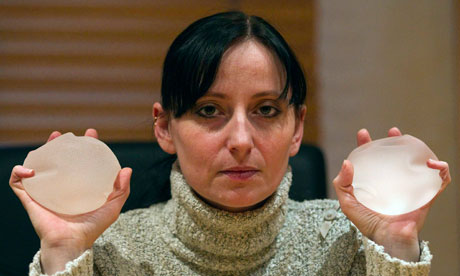
The plastic surgery scandal gripping France could soon become a medical emergency, with reports saying the government is to order 30,000 women to remove defective breast implants made from industrial silicone.
Senior officials told the Libération newspaper that the state would this week order the removal of implants from all French women given prosthetics supplied by the company Poly Implant Prothese, or PIP.
One of the world's biggest suppliers of breast implants, the southern French company was shut down last year after it was found to be cutting corners by making breast prosthetics from cheaper industrial silicone normally used for electronics and computer parts.
As well as containing non-medical silicone filler, the implants were found to have a high chance of bursting.
Around 30,000 women in France had already been implanted with the potentially faulty implants made from industrial silicone. Even more were affected in Britain, where 40,000 women had the implants.
In France, 2,000 women have filed police complaints and a criminal investigation has opened. But the scandal deepened this week after health officials reported eight cases of cancer in women who had received the implants, including one of a rare cancer affecting cells from the immune system.
The state has not established a link between cancer and the implants. But surgeons have advised the government to step up its handling of the scandal.
Valérie Pécresse, budget minister and government spokeswoman, said an action plan would be launched this week.
"All women who have PIP implants should return to see their surgeons urgently," she said, adding that these women could "potentially be in danger".
Libération said the government would this week take the unprecedented step of ordering the removal of every PIP implant. "We're facing a health crisis, linked to a fraud," said Laurent Lantieri, a leading French plastic surgeon on the state's advisory committee.
"There's no urgency, but we have no choice. All these implants have to be removed." He said it was about "prevention" not just "precaution".
Until now, women were advised to be scanned and remove the implants only if they had ruptured or burst.
In France, where at least 20% of the women with PIP implants received them during reconstruction surgery after breast cancer, some 523 women have already had their implants removed.
In the UK, the Medicines and Healthcare Products Regulatory Agency maintained its view that there was "insufficient evidence to indicate any association with cancer". It said women worried about rupture should see their surgeon, but there was "no evidence to support" routine removal of PIP implants.
Many women with PIP implants staged a demonstration outside the French health ministry last week, saying they felt they had been poisoned, insisting the state pay for removals and demanding more information on possible health risks. Alexandra Blachere, founder of an association to support the women, described a "wave of panic".

